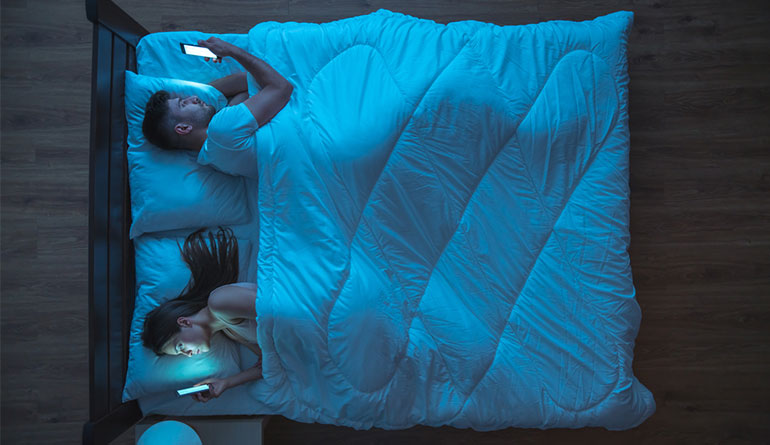Unplugging is important.
The constant urge to check emails and text messages affects every aspect of our waking hours.
While the ability to check-in at any given time can be useful during the day, the convenience of technology is wreaking havoc on our downtime—especially our sleep.
Why Screen Time Stresses Us Out
Cell phones are our loyal companions.
Most of us crawl into bed with them each night and wake up to them in the morning. Insomniacs often turn to them to make sleepless nights more bearable.
The problem is, when our phones are turned on, our brains are turned on, too. The subconscious is constantly on standby for an incoming text message, email, or push notification.
People who use electronic devices in bed are likely to have issues with insomnia, according to sleep.org.
This makes perfect sense; how many times have you been scrolling through your social media feed and been struck by a tragic news story right before bed or first thing in the morning? How many times have you received a late night text message from a stressed out friend? Examples like these keep us on edge. It’s difficult to truly relax while awaiting the next interruption.
How Electronics Hurt Our Health
Psychology Today contributor, Dr. Victoria L. Dunckley, explains that taking the body from fight or flight mode to healing mode is important. She notes that screen time has a negative impact on health, especially on our stress levels.
The physician points out that computer games can cause blood sugar and digestion problems, as well as impaired attention.
For children and teens growing up in this digital age, screen time could possibly lead to more health problems, not to mention the inability to engage with the people around them.
What You Can Do
Even if you’re a self-described screen addict, there are some simple steps you can take to unplug and establish a new normal at bedtime.
- Replace Your Screen Time: At first, unplugging may actually cause stress, as you’re most-likely used to inadvertently grabbing your phone and other devices for entertainment, comfort, or distraction. Reducing your screen time means more free time to do other activities. You may even need to reestablish what it is you love to do. Reading a book, journaling, or other relaxing activities will help you nod off at bedtime.
- Power Down: Huffpost.com suggests giving devices a curfew. Power them off and take them to another room in your home at least 30 minutes before going to sleep. Pick up a new alarm clock to replace your cell phone alarm.
- Meditate: Take a few minutes of your newfound free time to meditate each day. Studies show that meditation lessens anxiety, which allows us to relax. In a 2015 online article, Time Magazine highlighted a study in which men and women were taught mindfulness and meditation techniques. Researchers found that the people who learned these techniques not only had better sleep quality; their fatigue and insomnia symptoms also improved.
These new healthy habits will help you get a restful night’s sleep, so you’ll be ready to connect with the people and activities you love and appreciate the present moment.

